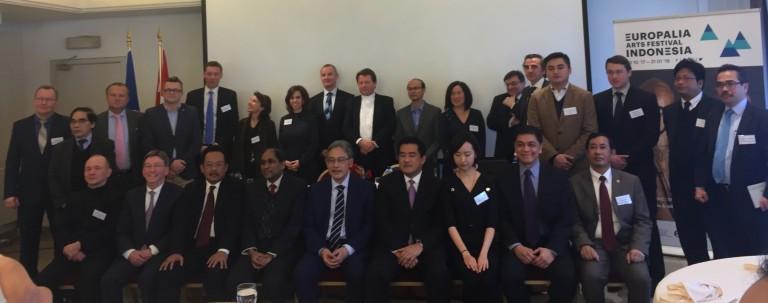On March 23 2017, the Embassy of Indonesia hosted a discussion on the book Doing Business in ASEAN Markets, published last year. The authors of this important book analyze the pitfalls and risks of doing business in ASEAN countries that are mostly absent in Western markets, covering various strategic, external, operational and legal-cultural challenges for international companies. The book highlights the need to create an international diverse and unified leadership team that will take better decisions and effectively deal with risks and apply best corporate governance practices within the ASEAN region.
In this context, the Indonesian Embassy invited Mr. Axel Goethals, CEO of EIAS, and Prof. Marc Deschamps, from the University of Liege, to a panel discussion which was moderated by Ms. Chen Xuechen, Visiting Fellow from EIAS, in order to gain expert views and share their broader understanding of business opportunities in ASEAN, particularly Indonesia.
The Indonesian Ambassador, H.E Mr. Yuri Octavian Thamrin, delivered the opening remarks and discussed the importance of doing business in the ASEAN market in the future, due to the great potentials that this region holds. He highlighted some of the key factors included in the book such as the recent trade agreements between ASEAN countries, that will enable a comprehensive regional integration framework to take place including the freedom of movement of goods, services, capital and labor.
Following the opening remarks by H.E Mr. Thamrin, Mr. Peter Verhezen gave a brief introduction to the book and outline the flaws and pitfalls of doing business in the ASEAN region. Mr. Verhezen stated that in the ASEAN region there are problems with institutional governance and the deep concentration of ownership, which need to be addressed.
After the brief introduction of the book by Mr. Verhezen, the floor was given to the expert panel to share their views and comprehensive understanding of the book. Prof. Marc Deschamps put the emphasis on leadership and governance. He also welcomed the book as an example of the important role that universities play in conducting research, disseminating information and making an impact on societies.
Mr. Axel Goethals reminded the audience that the ASEAN economies are highly diverse and at vastly different stages of development but all sharing immense growth potential. In comparison to Europe, which is somewhat more homogeneous in terms of culture, religion and language, the ASEAN region has very different economic and governmental structures, that include democratic and communist regimes. Mr. Goethals also highlighted the resilience of the middle class in the aftermath of the Asian Financial Crisis in 1997, which helped them navigate through the recent Global Financial Crisis with relative ease. He also emphasized the need to manage corruption effectively and create better governance practices at an ASEAN level. Mr. Goethals concluded his intervention by illustrating the progress ASEAN has made over the years, in becoming a global player and conducting business with major economies such as the EU, China, Pacific countries and many more, while maintaining their own values. He also stated that Europe, undergoing several crises at the moment, could learn a lot from the ASEAN experience.

